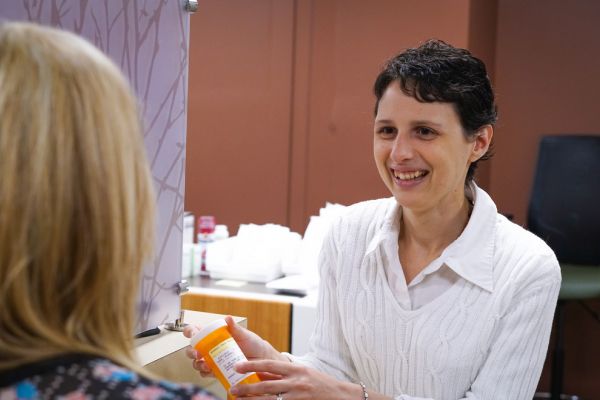Oncology pharmacists play a critical role in comprehensive care by guiding drug therapy decisions, managing symptoms and side effects, preventing adverse effects, determining off-label treatment options and educating patients and caregivers.
“We’re in a fascinating time in treating cancer because of new, up and coming therapies that are very patient-specific, precision medicine,” says Anthony Fernando, PhD, MBA, RPh, formerly of Roswell Park. “Our pharmacists are heavily involved in chemotherapy and immunotherapy treatment plans, and we work very closely with the medical team and patient to optimize the plan”
In addition, pharmacists help the physician team decide which new drugs would be appropriate for a patient as “off-label” use.
“A specific drug may not have an indication for treatment of a certain type of cancer, but studies, trials and case reports might say there are positive outcomes when using this drug, but the FDA hasn't officially stated it,” says Dr. Fernando.
Never miss another Cancer Talk blog!
Sign up to receive our monthly Cancer Talk e-newsletter.
Sign up!Pharmacists research and collect all the available safety and efficacy drug information to present to an internal review committee, which ultimately decides whether or not the patient should receive this drug.
Oral cancer drugs have impacted the way medical treatment is distributed and managed, as well. For traditional treatments such as chemotherapy or radiation, patients come to the hospital to receive their treatment, but oral chemotherapy allows patients to receive treatment in their own homes. Oral chemotherapy is a great treatment option for many patients, especially in terms of convenience, but does create a challenge for pharmacists and care teams.
“For an infusion, we’re delivering the drug to the patient at the hospital, with oral chemotherapies, we’re writing a prescription and when the patient leaves we’re hoping that they not only get the prescription filled, but also we’re hoping they’re taking it as they're supposed to,” says Dr. Fernando.
Oral chemotherapies and immunotherapies are specialized and hazardous medications. Patients who have these prescriptions filled at a general retail pharmacy may not receive all the important instructions and the general pharmacist may not be familiar with these medications. “We frequently see patients come back to their next appointment with problems or we find out they haven’t even started treatment,” says Dr. Fernando.
Roswell Park’s specialty pharmacy is designed to meet the oral chemotherapy and immunotherapy needs as well as other retail pharmacy needs. Clinics at Roswell Park work closely with our own specialty pharmacy so patients can pick up their prescriptions the same day they see their doctor. “By using our pharmacy, we’re keeping this care in-house. Our patients go from the clinic over to the pharmacy where our pharmacists, with specialty training in these medications, can spend the time with the patient and their caregiver to explain these complex, hazardous medications and answer any questions, even after the patient goes home. We feel like the continuum of care by the Roswell Park medical team goes on if we process patient’s prescriptions here.”

